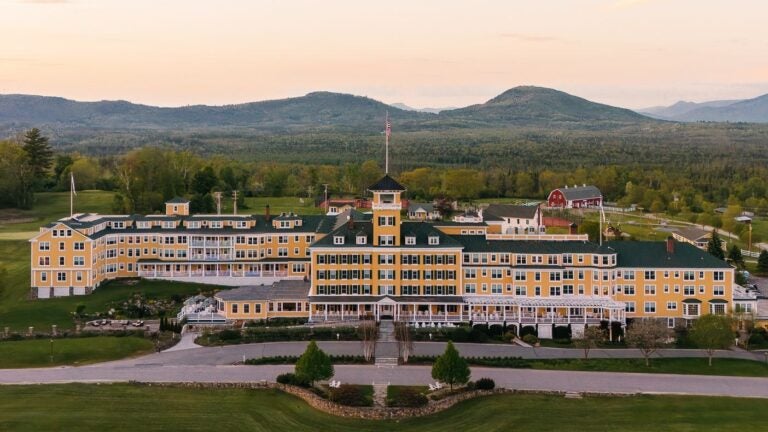Jobs
Reporter’s Notebook: Dispatches from the Greenbrier Resort

I’m writing this week’s column sitting at a fancy writing desk off of the lobby of the historic Greenbrier Resort in White Sulphur Springs.
No, I am not staying at the Greenbrier. I’m just a humble newspaper reporter who is staying at a nearby Super 8 Hotel. But I have been attending the 88th West Virginia Chamber of Commerce Annual Meeting and Business Summit.
The Business Summit is probably one of my favorite events to cover. My beat is covering state government, but my beat often intersects with business, whether that means lawmakers crafting bills to draw more businesses here, tax policy, covering our energy sector, taxpayer-funded loans for major economic development projects, etc.
Face-to-face interactions and networking are important. It helps me build sources I can reach out to for expertise. It helps promote our newspapers and bring our reporting to the attention of business leaders. It also helps make companies feel more comfortable engaging with the press.
In this online world where we rely on streaming, social media, and emails, it’s easy for anyone to fear news reporters or make assumptions when you see our emails, such as we’re coming after you. And due to email being impersonal and emotionless, it can be easy to project your own emotions and assume the worst about our intentions.
And look, sometimes I am sending you an email or a phone to ask some hard questions. But when you fear the media and assume the worst about us, you’re going to be less likely to talk. And that’s not good for me and it is certainly not good for politicians, government officials, and business leaders.
But the Business Summit allows me to talk to all of these people at once in a friendly environment, make introductions, and show that news reporters are not the monsters under the bed. So, when I do call or email, the chances of someone responding increases.
I’ve been in this business for a while now, and I can tell you not much good comes from ignoring reporters, banning reporters from press events, or being outright hostile. I was pleased to see Gov. Jim Justice and his administration allow WV MetroNews reporter Brad McElhinny back into the weekly virtual briefings, but being banned since the middle of July didn’t stop McElhinny from continuing to report on near-daily issues with Justice’s vast business empire.
Reporters don’t stop writing stories because you don’t talk to us. But talking to us can substantially change a story. Most reporters don’t start off with an agenda; we simply follow the facts that we have at any given time. Good reporters change stories when the facts change. And we’re not trying to be negative, but we are naturally skeptical.
And economic development announcements are things that reporters are going to be somewhat skeptical about. Sure, we’re happy to write about the initial announcements and claims of multi-million-dollar investments and potential job creation. There is a honeymoon phase when it comes to these kinds of announcements.
However, at some point it’s our job to follow up on the claims, especially when state tax dollars are involved. I’ve written several articles like this, including very recently about a clean energy start-up who chose to ignore me and delay rather than engage with me in a candid conversation; a project that has quite a large number of skeptics. Without naming the company and going into detail, that company was not happy with the framing of that story.
In short: dialogue is always better than silence.
***
One of the questions I was asked by an attendee at the Business Summit was an interesting one: who is going to be the next state senate president in 2025? Senate President Craig Blair, R-Berkeley, lost his primary election, which means the position will come open next year.
I could speculate on potential candidates for the job. It’s not a leap to say Senate Majority Leader Tom Takubo, R-Kanawha, is a likely candidate, as majority leaders are usually the first logical choice. Senate Finance Committee Chairman Eric Tarr, R-Putnam, is another possibility. But I’ve heard everything from Senate Education Committee Chairwoman Amy Grady, R-Mason, to Senate Energy Committee Chairman Randy Smith, R-Tucker, to state Sen. Mike Oliverio, R-Monongalia.
But I’m more interested in the timing of things. For example, the next governor of the State of West Virginia will be sworn in on Monday, Jan. 13, 2025. The state Constitution requires the governor and elected members of the Board of Public Works to take office on the “first Monday after the second Wednesday of January next after their election.”
Depending on the outcome of the November election, Republican Gov. Jim Justice could be our next U.S. Senator, replacing U.S. Sen. Joe Manchin, I-W.Va. According to the U.S. Senate, Manchin’s final full six-year term ends on Jan. 3, 2025. That would mean Justice will need to resign as governor in order to be sworn in as a U.S. senator.
The leaves a gap between when Justice would have to resign and when the Legislature gavels in to open and publish election returns. This will occur on Wednesday, Jan. 8, 2025. The Legislature then gavels out until Feb. 12, 2025. The House of Delegates and state Senate will also choose their presiding officers on Jan. 8, 2025.
So, if my reading of the state Constitution is correct, there is a real potential for Senate President Blair to briefly serve as Senate President Acting as Governor.
Steve, you mean “acting governor, right? Nope, there is actually no such title. The senate president has the honorary title of lieutenant governor, but the state Constitution has no such position as “acting governor.”
This caused a problem in 2010 when then-Gov. Joe Manchin resigned to run in a special election for U.S. Senate when Robert C. Byrd died. Then-Senate President Earl Ray Tomblin became Senate President Acting as Governor, but some found it distasteful for Tomblin to be head of half of the legislative branch of government and the temporary head of the executive branch.
And he couldn’t resign from the state Senate, because only the senate president can be the “acting governor.” So, the Senate created the position of acting senate president to fill in for Tomblin while he did his duty as Senate President Acting As Governor (or was we reporters called him at the time, SPAAGERT). Tomblin won a special election for governor and took office in 2011. The first acting senate president was Jeff Kessler, D-Marshall, who was later selected as the official senate president.









